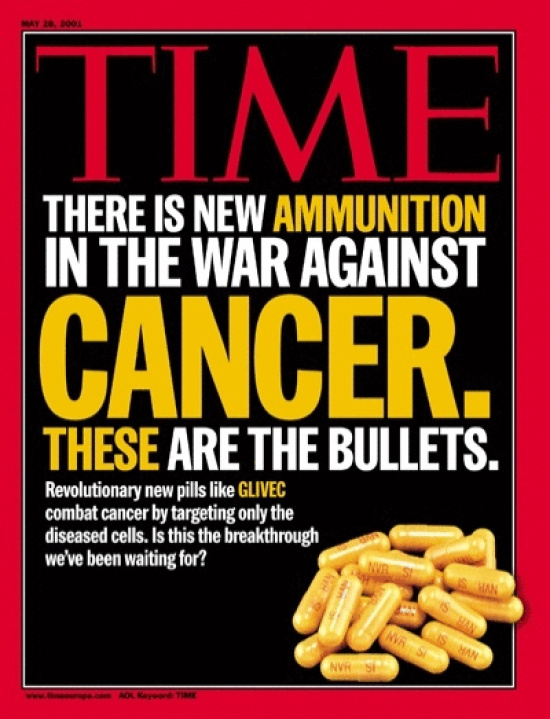The military terminology used with respect to cancer…reflects a misguided, quintessentially American notion that all problems can ultimately be solved and all social ills eliminated, if individuals and society are merely sufficiently aggressive and determined.
— John S. Koppel, letter to NYT Book Review
###
With all the wars in which we’ve managed to entangle ourselves – Afghanistan, Iraq, Syria and beyond – you might think we’d be war-weary when it comes to the home front. Not so. We are, if you believe the headlines, fighting wars every which way on: poverty, drugs, cancer, obesity, GMOs, science, American values, unborn children, not to mention the all-purpose, justifies-anything “War on Terror.” Everyday the media reinforces our siege mentality: There are enemies out there, and it’s our duty to fight on the side of the good guys until, with God on our side, we win.
Perhaps the best example of the sheer futility and stupidity of such wars is the “War on Cancer” which President Nixon declared in 1971, assuring us that it would be won within ten years. More recently, President Obama promised the war would be won “in our time.” Good luck with that. Since Nixon’s quixotic call to arms, cancer has overtaken heart disease as the leading cause of death in this country; one in three of us will be affected by it.
Richard Nixon signing the National Cancer Act into law, December 23, 1971.
But cancer isn’t going to go away so long as the cells of our bodies continue to reproduce. The only way to win the War on Cancer is to re-tool human anatomy. As I explained in a piece I wrote for the North Coast Journal two years ago:
Every second, some four million cells in each of our bodies clone themselves by copying their DNA into two new cells, each virtually identical to its parent. The process isn’t perfect, and occasionally a mutation occurs — if the process were perfect, we’d never have gotten beyond the original cell that kick-started life on Earth. Mutated cells usually die right away, but sometimes they survive. Countless reproductions later, their progeny become cancerous, forming a tumorous colony of “rogue” cells that can somehow evade the body’s macrophages and other natural defenses. Not so difficult, since they’re not exactly alien cells.
I see at least two problems when we resort to the bellicose language typically used with cancer treatment.
One is very practical: We’re less willing to take preventative measures if we think we’re fighting a war. For instance, test subjects were asked how they would react if they were diagnosed with colorectal cancer described as “an enemy uprising of abnormal cellular growth.” They were less likely to be willing to limit high-risk behaviors (such as overeating or excessive consumption of red meat, high fat foods and alcohol) than a control group whose hypothetical cancer was described simply as “abnormal cellular growth.” We’re inclined to fight fire with fire; if the enemy’s out there, we want to go in with all guns blazing – that is, with chemotherapy, radiation treatment and surgery. Where’s the guts and glory in simply going on a diet?
The other reason to avoid all the fight talk is the moral judgments that come up when someone “loses their battle.” Truth is, once you’ve got cancer, it’s probably never going to go away completely, and at some point, after a few months or after years in remission, there’s a good chance you’ll die of it. And at that point, what does your obituary say? That you fought bravely (but apparently, not bravely enough) and you lost your fight. I guess if you didn’t conquer your cancer, you just weren’t strong enough, or perhaps you lacked will power, or you surrendered.
Oh please! If I die from cancer, it will be because one set of cells in my body figured out how to outgrow another set of cells. No battle, no war, just nature taking her course.
###
Barry Evans gave the best years of his life to civil engineering, and what thanks did he get? In his dotage, he travels, kayaks, meditates and writes for the Journal and the Humboldt Historian. He sucks at 8 Ball. Buy his Field Notes anthologies at any local bookstore. Please.


CLICK TO MANAGE